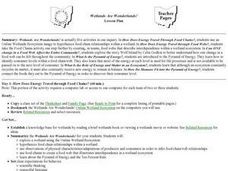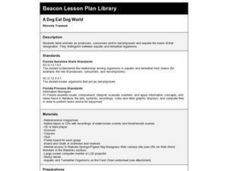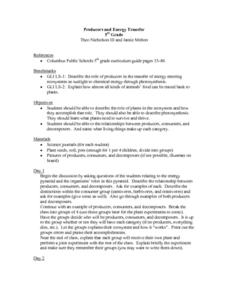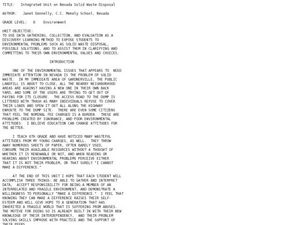Curated OER
A Feast for the Future
Students participate in an activity that uses a simulated meal of transgenic foods in order to initiate a discussion of the controversy concerning the use of transgenic food products.
Curated OER
Regulation and handling of animal products: a special challenge
Students examine how food safety affects sustainable animal production and marketing. In this agriculture lesson students complete several activities including one on groceries and the rules of animal products.
Curated OER
Plants 'R' Us!
Students investigate the interdependencies of plants and animals, and study what a food web is. They create a food web using yarn and images.
Curated OER
Wetlands Are Wonderlands!
Students explore the wetlands. They participate in numerous activities to explore food chains, food webs, and energy in the ecosystem. Students read stories, sing songs, visit specified websites, and participate in games to discover...
Curated OER
Everything's Connected
Students explore how trash decomposes. In this ecosystem instructional activity, students discuss new vocabulary words, such as producers and consumers, and think critically to answer how landfills work.
Curated OER
Organisms and Their Environment
Students observe elements of a local ecosystem and gain an understanding of what elements make up an ecosystem. In this ecosystem lesson students create a class food web that shows the interactions among the elements of the...
Curated OER
A Dog Eat Dog World
Fourth graders distinguish between acquatic and terrestrial organisms. They label animals as producers, consumers, and/or decomposers.
Curated OER
Producers and Energy Transfer
Fifth graders discuss the relationship between producers, consumers, and decomposers as they look at the energy pyramid. While working in small groups, they create an ecosystem that includes all or some of the given categories, and they...
Curated OER
Everyone Up!
Students examine various agriculture careers, both direct and indirect, related to crop production and distribution. In this food production lesson, students role play the processing chain in which crops move from producer to processor...
Curated OER
Chewin' in the Chesapeake
Students examine a web page on food webs and select a habitat to research. In this research lesson students identify the organisms found in the food web and present their findings to the class.
Curated OER
Circle of Life
Students consider why we eat and where our food obtains its energy. They illustrate food chains that might be found on an open field, dissect owl pellets, identify the remains of animals in the pellets, watch videos and participate in...
Curated OER
Insect Travel Brochure
Seventh graders study producers and consumers in habitats. They examine the trophic levels and how different organisms interact with a focus on insects. They create a travel brochure for an insect to visit a habitat which they create.
Curated OER
Needs and Wants
Students demonstrate responsible consumer choices. In this social studies lesson, students read The Lorax and discuss wants and needs. Students discuss how to save natural resources by making informed consumer choices.
Curated OER
Bacteria
Young scholars study food borne illnesses and what foods are more likely to carry them. In this investigative lesson students examine harmful bacteria.
Curated OER
Predator and Prey Game
Students explore the why the balance among producers, predators and prey is necessary in order for an ecosystem to be sustained over time. Through web games and activities, they discover how each component of the food chain works to...
Curated OER
Habitat survival
Sixth graders study different environments and how the food chain affects the survival of different animals. In this environments lesson plan, 6th graders share the visuals which describe the characteristics of the environment that they...
Curated OER
Packaging: What a Waste!
Students examine the environmental and economic impacts of excess packaging. They investigate the price and relative amount of processing and packaging of different food products in a local grocery store, analyze graphs, and complete a...
Curated OER
Mangrove Ecosystem
Eager ecologists explore ecosystems through video and photographs of a Mangrove. They discuss the animals in this habitat and how they interact with each other after reading and discussing "The Sea, the Storm and the Mangrove Tangle."...
Virginia Department of Education
Photosynthesis and Cellular Respiration
Provide high schoolers with their own indoor gardens! Emerging scientists discuss the process of photosynthesis and germinate seeds before growing plants in multiple lighting conditions. The hands-on application allows...
Curated OER
What is an Ecological Footprint?
Introduce youngsters to the term ecological footprint. Learners identify ways in which humans affect the environment. They look at the problems associated with the use of natural resources, and focus on ways to preserve natural...
Curated OER
Integrated Unit on Nevada Solid Waste Disposal
Sixth graders examine how to gather and interpret data, accept responsibility for the environment, and demonstrate an interest in making a difference in this series of lessons.
Curated OER
Basic Nutrition (Nutri/Food)
Students analyze the nutrition found in a food and compare it to the nutrition found in similar food. They compare the nutrition of different products and complete the student worksheet Pyramid Pizzazz. This can be done at the beginning...
Curated OER
Food webs and Energy Flows
Students become familiar with food chains. In this food chains lesson, students understand that as consumers eat other consumers energy is passed. Students understand the vocabulary associated with food chains.
Curated OER
The Balance of Good Health and the Food Pyramid
Pupils explore the importance of good health and the food pyramid. They examine food labels and the importance of healthy food choices. Students investigate food additives.























